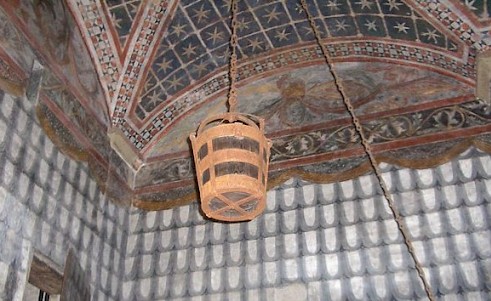Stupid Reasons to Go to War in the Middle Ages
“Our greatest conflicts have ridiculous origins and causes. Just think how our last duke of Burgundy ruined himself by a quarrel over a cartload of sheepskins.” - Essais, by Michel de Montaigne

The latest issue of Medieval Warfare magazine looks at the German Peasants’ War, which ravaged much of central Europe in 1524 and 1525. While there were many long standing grievances that led to the uprising, Kelly DeVries notes that outbreak of hostilities was caused by this unusual incident:
In Fall 1524, as her peasants were working long hours harvesting grain in Stühlingen, Helena, countess of Lupfen, required them also to collect snail shells for use as thread spools. It must have seemed a small task to her, but dissatisfaction against the added work grew among these peasants, with an estimated 1,200 gathering in protest within a few days.
The idea that collecting snail shells could trigger a war that involved hundreds of thousands of men might seem strange, but a closer look at the Middle Ages reveals several wars that began for stupid reasons. Montaigne’s quote about the last duke of Burgundy refers to how Charles the Bold (1467-77) became involved in war with the Swiss Confederacy. According to the chronicler Philippe de Commines, the fighting started when one of Charles’ underlings, the Count of Romont, used a dispute with Swiss officials to seize a cartload of sheepskins from a merchant. Retaliations would then take place, eventually leading to the Burgundian duke invading the confederacy. It would end with his own defeat and death at the Battle of Nancy.
Another strange medieval conflict was the so-called ‘War of the Bucket’, fought in 1325 between the Italian city-states of Bologna and Modena. They had been foes for many years before this, and during a period of heightened tension, a group of Modenese soldiers sneaked into Bologna, and stole a bucket from the main city well. The Bolognese demanded the return of the bucket, which was refused, and then mustered an army of 32,000 men to attack Modena. However, the Modenese met them at the Battle of Zappolino. Two thousand men were left dead on the battlefield, and the Bolognese being routed. You can still see the famous bucket on display in Modena.

While this conflict was at least short-lived, the War of Saint Sabas would be fought for fourteen years. It started because of a dispute between the Venetian and Genoese residents of Acre, who had compounds at the foot of a hill within the city. On the top of this hill was a house belonging to the monastery of Saint Sabas, but both Italian groups claimed that property was theirs. In 1256, after years of court proceedings, the Genoese decided on a more aggressive approach. They not only seized the house but attacked the Venetian residents and their ships, driving them out of Acre. Their war would soon extend throughout the Crusader States, with each side finding allies from among the various noble households. Even the two main military orders - the Hospitallers and the Templars - found themselves fighting against each other.
Finally, perhaps the most ridiculous war took place in 1428-9 between the city of Metz and the duchy of Lorraine. In his book War in the Middle Ages, Philippe Contamine describes how an abbot from a monastery in Metz picked a basket of apples from a garden belonging to another group of monks. He writes:
Learning of this these monks went to complain to the duke of Lorraine who ‘several times requested the city’ to give him the right to judge the matter. Naturally the city turned a deaf ear, fearing that if it agreed it would create a dangerous precedent for its own franchises. The duke then took a pledge against the town of Metz in a village in its territory. In its turn Metz demanded compensation, which of course was followed by a ducal refusal. Metz then took revenge by sending its paid force into the duke’s lands, all these events having taken place in the most legally correct fashion. Before using force, legal measures had been taken and both parties could then with clear consciences have recourse to arms.
Please check out the latest issues of Medieval Warfare magazine.




